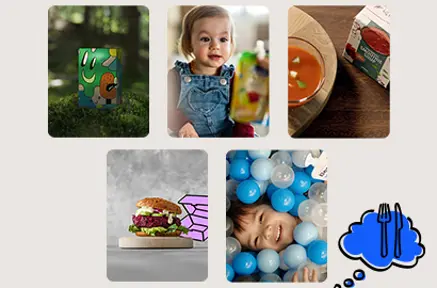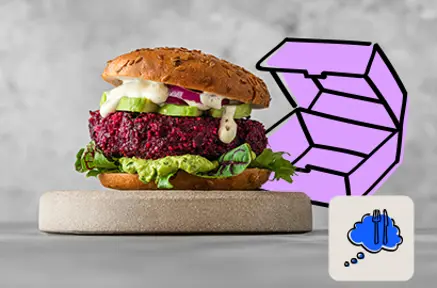Innovation and partnership to improve global food access

Of all the food grown globally for human consumption, approximately 40% is wasted or lost. Yet, millions of people around the world go without food, particularly in countries which lack the means to preserve food. Food waste alone also generates approximately 8-10% of global greenhouse gas emissions. It is clear the world’s food system cannot continue to operate how it currently does. With global food demand set to increase by 35% by 2030, how will we feed and reach more people nutritiously, all while reducing emissions?
The role of innovative products
The food industry needs to take action on multiple fronts to optimize access to nutritious foods, reduce food waste, and support food security. Packaging solutions, such as SIG’s aseptic packaging, are vital to achieving reductions in food loss and waste due to their ability to store nutritious food for the long-term.
Aseptic packaging enables the long-term storage of nutritious food without the need for preservatives, energy-intensive cooling and refrigeration during distribution and storage. For instance, the shelf-life of a product such as extended shelf-life milk, stored in chilled conditions, is 30 days. For UHT milk, stored in ambient conditions in an aseptic carton packaging, it is 6 months.
The aseptic process eliminates bacteria that can harm the food or beverage by combining sterile products with sterile containers. The High Temperature Short Time (HTST) processing retains more color, flavor, and nutrients in the product. Aseptic packaging is critical in reducing food loss and waste and in ensuring food safety and supply in vulnerable regions that have no reliable cooling systems – by keeping food fresh for long periods without refrigeration.
Partnering to break down barriers in accessing nutrition
Through 2024, SIG has been proud to lead initiatives across the world, in partnership with our stakeholders, to improve access to nutritious food.
This year, we published the Climate and Health Toolkit for Food Businesses in partnership with the Forum for the Future’s Climate and Health Coalition, providing resources to equip organizations to address the ongoing climate and health crises. Through a series of practical guidance, training modules and case studies, the toolkit is aimed to help retailers, food producers, and packaging companies play an active role in delivering integrated solutions to climate and health.
We have also continued our groundbreaking partnership with AnaBio Technologies to provide an extended shelf life to probiotic beverages and food products. Probiotics have various health benefits, including enhanced immunity and improved gut health. However, the expansion of probiotics into markets around the world has been limited as they require refrigeration infrastructure that is not always available. Through our partnership, SIG has helped extend the access of healthy probiotics to new parts of the world, by enabling them to be stored at room temperature for extended periods of time, helping to ease the dual challenges of nutrition and access. This is paving the way for new products: In 2024, SIG and AnaBio have worked with MilkyMist to launch the world’s first long-life probiotic buttermilk in aseptic carton packs.
In 2024, SIG has continued to work with our flagship Cartons for Good (CFG) initiative in Bangladesh and is now expanding to other countries around the world. Through our CFG partners, we purchase produce grown by local farmers that would otherwise go to waste and develop these into nutritious recipes and hydration. These products are then packaged in our cartons and distributed to those in need.
Since the beginning of CFG in 2019 in Bangladesh, we have learned how essential shelf stable food is in times of crisis. When NGOs have faced challenges in distributing fresh food to people, our CFG initiative was able to support NGOs in supplying nutritious food that would last for up to 12 months without the need for refrigeration. Across 2024 in Bangladesh, CFG has delivered over 20,000 packs of food and prevented approximately six tons of vegetables from being wasted and lost, and when devastating floods hit the country, the CFG partnership showed its value in feeding victims of disasters, distributing more than 4,000 packs of khichuri and vegetable mix to those affected.
Finally, this December, SIG’s Foundation has continued our global tradition by donating to Food Forward South Africa’s Mother and Child Nutrition Program, which focuses on alleviating child malnutrition. The initiative works with partners such as the Grow Great Campaign and the Department of Health and has delivered its first batch of essential monthly food boxes to 100 mothers and their children. These nutrient-rich food boxes will be important in supporting the healthy development of these children.
Looking ahead to 2025
Reflecting on the achievements in improving food access and reducing food waste in 2024 also puts SIG in a strong position to drive impact in 2025. In Thailand, working with Ampol Foods as part of our CFG initiative, we are introducing a new jelly product that will be created from surplus fruits and packaged in SIG cartons to provide access to nutrition to elderly populations and those who face problems swallowing.
We will also continue to engage with partners and organizations across the food system with our Climate and Health Toolkit, driving more impactful solutions and innovative products that seek to reduce emissions in the food system while providing nutritious food.
We have learned several lessons expanding nutritious food access over the years. From working with local partners and using innovative technologies, we are committed to growing our impact. Our pledge to future generations is to create a regenerative food packaging system that helps eliminate food loss and waste, improve food availability and security, and ensure that nature can thrive. A critical component of this is the role we are playing in supporting access to nutritious food all over the globe. We look forward to supporting our customers, stakeholders and communities in 2025 to reach more, feed more and deliver impact along the way.
- декабрь 19, 2024

Unpacking the food and beverage industry

The leaders of the pack

